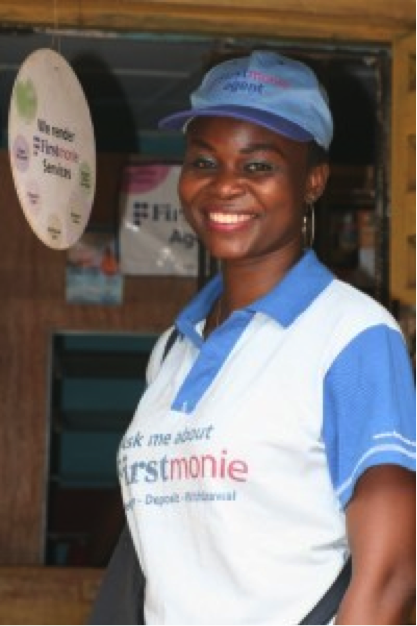The Female Factor: Why enrolling more women as mobile money agents can benefit service providers, customers – and the agents themselves
After an early start to beat the traffic, I take a seat next to Helen Lightcrown in her small shop, which sells hair products in the Oshodi district of Lagos. A generator is humming away outside, powering a ceiling light and a small fan which provides some relief from the heat and humidity. I’m in Lagos to meet women entrepreneurs who are training to become agents at Firstmonie – a mobile banking platform offered by Nigeria’s FirstBank. As agents, they will offer banking services to their local communities, where limited access to bank branches is one of several factors preventing a large population of Nigerians from accessing formal financial services.
Thanks to funding from Visa, the Cherie Blair Foundation for Women has partnered with FirstBank and the Youth for Technology Foundation (YTF) to train 2,500 women entrepreneurs across 10 Nigerian states as Firstmonie agents. FirstBank provides technical training on the banking products, which is supplemented with broader training on business and financial literacy skills, delivered by YTF. Our research has shown that enrolling more women into agent networks can extend commercial benefits to service providers, as higher levels of customer service delivered by women agents increase public trust in bank products and brands.
As a Firstmonie agent, Helen (pictured above) provides banking services to customers from her existing shop through the use of a mobile device – essentially acting as a mini, one-person bank branch. Customers can register accounts with her, make deposits and pay bills, all without having to travel long distances to formal bank branches.
Helen’s new business is prominently marketed by the FirstBank promotional banners festooning the exterior of her shop. But Helen is taking the publicity one step further: In the induction training delivered by the bank and YTF, she learned that she can’t just rely on passersby for trade. So every day Helen heads out to the local market to promote both her hair care products and her Firstmonie business. She says that the training has also made her feel more confident with managing her money and keeping better business records.
Helen tells me about some of the challenges she faces. It’s not just that people don’t have enough money to save – a lot of the people she approaches are also wary of institutions like banks, and need to be convinced of the benefits of formal banking and the services she is able to offer them. Helen has also overcome technology barriers, moving away from a relatively expensive, cumbersome and unreliable text-based (USSD) system, to downloading the bank’s mobile application to her handset. Although this requires data access, it is actually cheaper and easier for her to transact. Helen can now use this application to easily register customers and credit their accounts through her mobile handset. She tells me, “Right now I am creating awareness locally and registering customers, focusing on people I know and who trust me.” She is clear about her motivations for becoming an agent, saying, “People always want quick results, but I’m not doing this for now, I’m doing it for when I am 60.”
 Later in the day I also meet Tope Ajelewa (left) in Agege, another district of Lagos. Tope has an established business selling airtime for each of the major mobile network operators. Tope was able to easily integrate the Firstmonie agency business into her existing activities, and she told me that “no one calls me Tope anymore, they call be ‘Firstmonie, Firstmonie’ because they see me around town in my Firstmonie T-shirt and cap.”
Later in the day I also meet Tope Ajelewa (left) in Agege, another district of Lagos. Tope has an established business selling airtime for each of the major mobile network operators. Tope was able to easily integrate the Firstmonie agency business into her existing activities, and she told me that “no one calls me Tope anymore, they call be ‘Firstmonie, Firstmonie’ because they see me around town in my Firstmonie T-shirt and cap.”
Tope was first introduced to the Firstmonie opportunity through her local church group, and attended the training to find out more. She said, “I realised that as there are no bank branches around here, it was an opportunity to help those women needing to pay school fees.
“At the training, I learnt how to transact this business as an agent, how to transfer funds, and how the banks charge – as well as the benefits of being an agent. I also learnt how to manage my money to help me get started, and how to manage money at the end of each month.”
Explaining how she gains new customers, Tope tells me, “Mostly what I do, when I sell airtime, I go around and introduce the business to them, explain that you now don’t need to go all the way to a bank branch to open an account – I can do that for you. Also you can transfer money to any bank or pay bills through me. Even when I am not around, I have customers phoning me – I have approximately 50 customers.”
Helen and Tope are just two of the women who are benefitting from our project in Nigeria. They are proof that, with a little bit of training and encouragement, women are able to overcome some of the barriers they face in generating a sustainable income for themselves and their families. Furthermore, as mobile banking agents, they will extend vital financial services to underserved Nigerian communities, playing a key role in fostering greater financial inclusion in the country.
Find out more about this project here.
Editor’s note: This post was originally published on the Cherie Blair Foundation for Women. It is cross-posted with permission.
Matthew Strickland is Mobile Technology Programme Manager at the Cherie Blair Foundation for Women.
Photo courtesy of Ismael Ferdous.
- Categories
- Uncategorized
